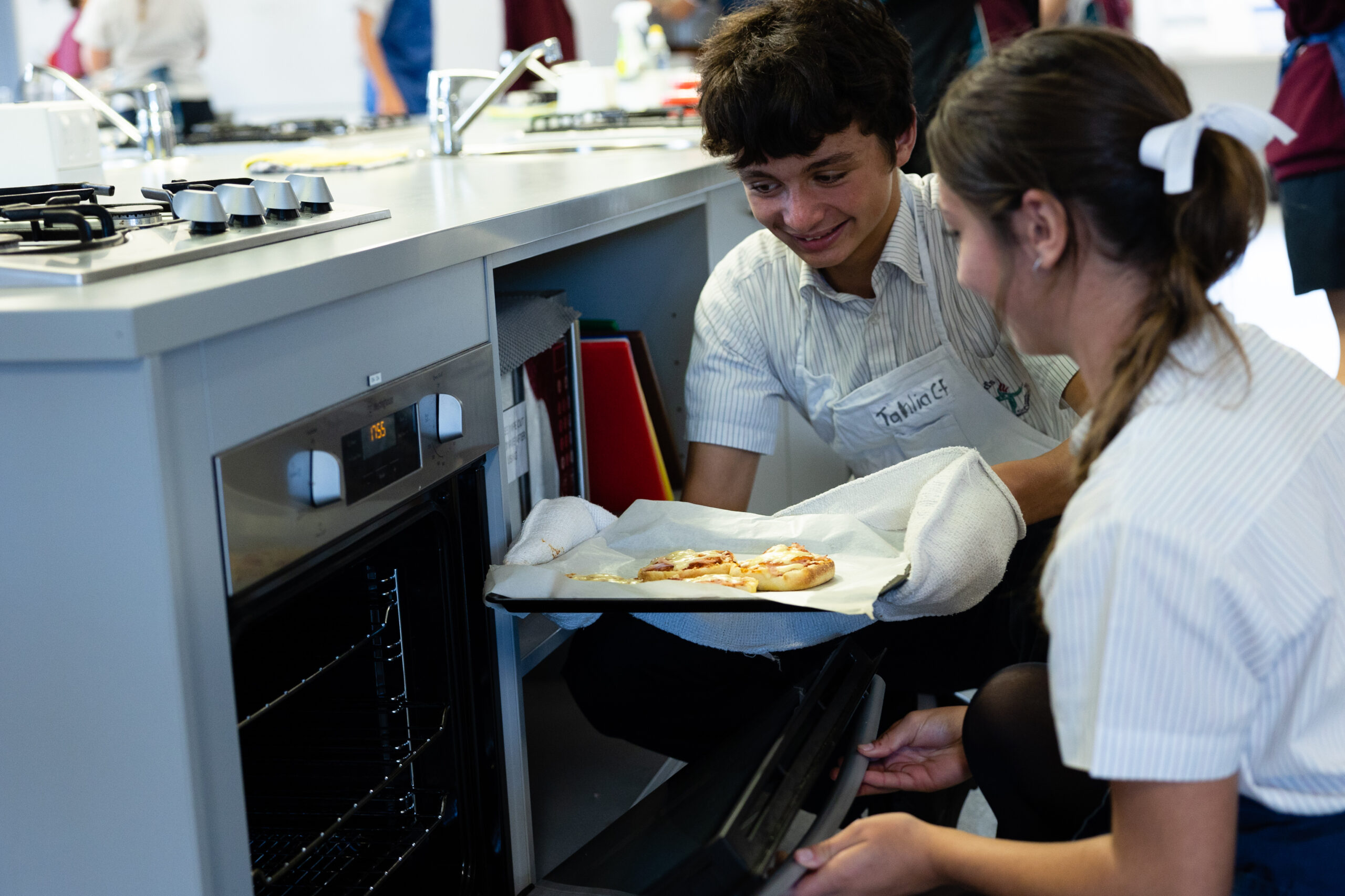Through their responding and composing of both critical and creative texts, students develop an understanding of themselves and of diverse human experiences and cultures. The study of English in Stage 6 provides students with opportunities to experiment with ideas and expression, to become innovative, active, independent learners, to collaborate and to reflect on their learning. NESA 2023
SUBJECTS OFFERED
- English
- Religion
- Mathematics
- Creative Arts
- HSIE
- Languages
- Online Courses
- PDHPE
- Science
- Technology
- TVET and SBAT Courses
- VET
English
Through the study of English in Stage 6 students continue to develop their capacity to understand and use the English language for a variety of purposes and in various textual forms. Students engage with and explore a variety of texts that include widely acknowledged quality literature of past and contemporary societies.
English Courses
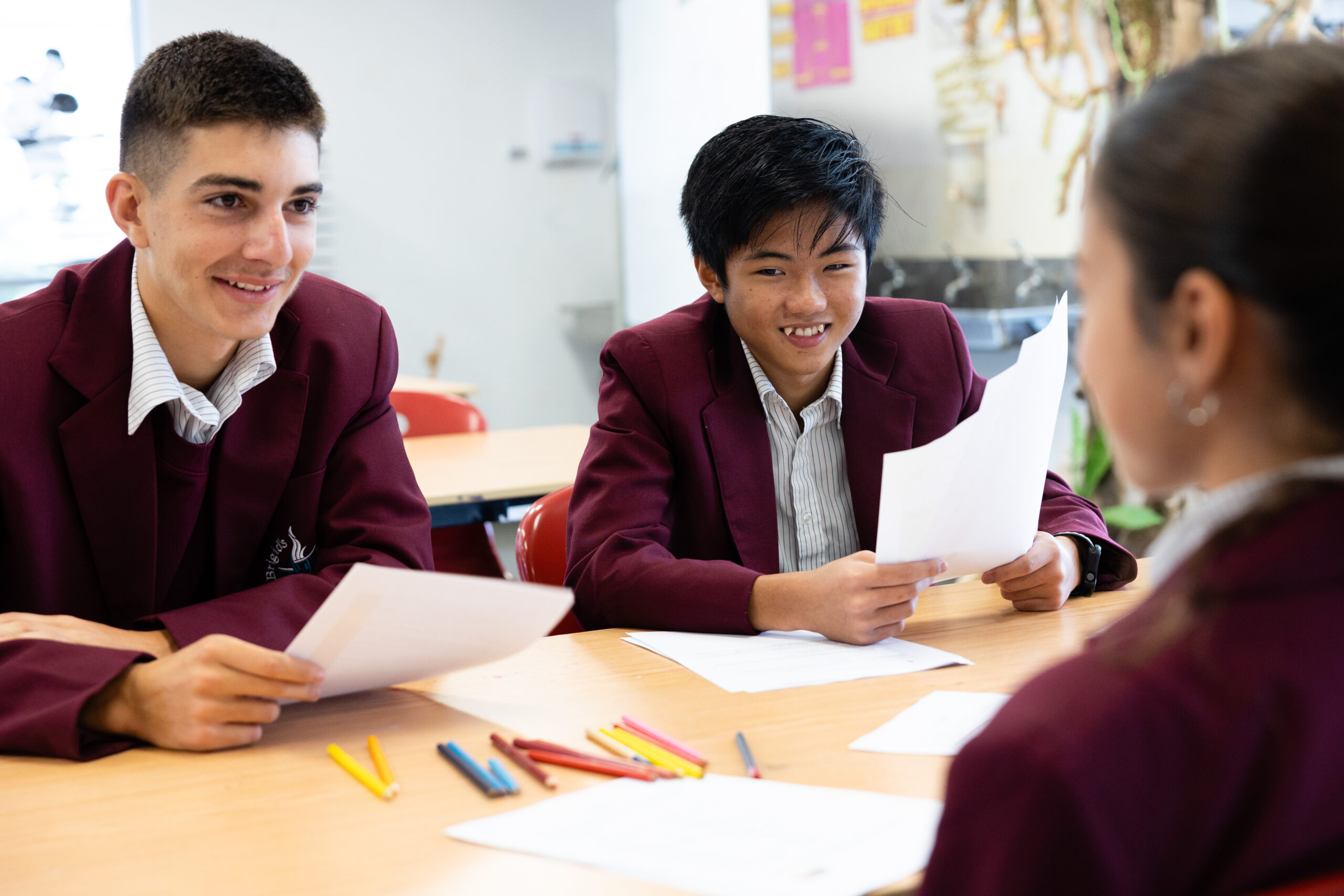
English is a compulsory course for students studying the HSC. Students are best to choose a course that allows them to cope with the demands and complements their level of understanding and skills in English. Year 10 English teachers are best placed to help the students to navigate which course they should do.
WHO CAN I SEE TO GET MORE INFORMATION?For more information, please contact the Leader of English
ENGLISH STUDIES (CATEGORY B)
This course is designed to meet the specific needs of students who wish to refine their skills and knowledge in English and consolidate their literacy skills. The English Studies course provides students with opportunities to become competent, confident and engaged communicators and to study and enjoy a breadth and variety of texts. Students explore the ideas, values, language forms, features and structures of texts in a range of personal, social, cultural, academic, community and workplace contexts. Through responding to and composing texts students strengthen their ability to access and comprehend information, assess its reliability, and synthesise the knowledge gained from a range of sources for a variety of purposes. NESA 2023
ENGLISH STANDARD
ENGLISH ADVANCED
In the English Advanced course, students continue to explore opportunities to investigate complex ideas in challenging texts, to evaluate, emulate and employ powerful, creative and sophisticated ways to use language to make meaning, and to find enjoyment in literature.
Students refine their understanding of the dynamic relationship between language, texts and meaning. They do this through critical study and through the skilful and creative use of language forms and features, and of structures of texts composed for different purposes in a range of contexts. Through study of the course modules students continue to develop their skills to question, reconsider and refine meaning through language, and to reflect on their own processes of responding, composing and learning. NESA 2023
ENGLISH EXTENSION
In the English Advanced course, students continue to explore opportunities to investigate complex ideas in challenging texts, to evaluate, emulate and employ powerful, creative and sophisticated ways to use language to make meaning, and to find enjoyment in literature.
The English Extension course provides students who undertake Advanced English and are accomplished in their use of English with the opportunity to extend their use of language and self-expression in creative and critical ways. The course is designed for students with an interest in literature and a desire to pursue specialised study of English.
Through engaging with increasingly complex concepts through a broad range of literature, from a range of contexts, students refine their understanding and appreciation of the cultural roles and the significance of texts and about the way that literature shapes and reflects the global world. NESA 2023
Religion
Religious development is an important aspects of life here at St Brigid's and in Stage 6 Religious education is compulsory. We offer two courses here that should suit students needs.
Students must choose a 1 unit of the Religious education courses offered below.
-
Studies of Religion is a Category A subject that can be studied as 1 unit or 2 units.
-
Catholic Thought is a Course Endorsed Course that is studied as 1 unit.
COURSE DESCRIPTION
Studies of Religion 1 unit (Category A)
Studies of Religion I promotes an understanding and critical awareness of the nature and significance of religion and the influence of belief systems and religious traditions on individuals and within society. NESA 2023
Studies of Religion 2 unit (Category A)
Studies of Religion II promotes an understanding and critical awareness of the nature and significance of religion and the influence of belief systems and religious traditions on individuals and within society. NESA 2023
Catholic Thought 1 Unit (Category B)
Catholic Thought is structured around the study of two themes central to the Catholic tradition; Who is a human person? and The Good Life. It is through the exploration of these themes that students come to a deeper understanding of the richness of Catholic belief, thinking and tradition. 2018

Catholic Thought
STUDIES IN CATHOLIC THOUGHT SYLLABUS
Studies in Catholic Thought is available for study as both a 1unit, 60 hour course and a 2 unit 120 course for students in Year 11 and Year 12.
The 1 unit course requires students to complete three core modules at 20 indicative hours in Year 11 and another three core modules at 20 indicative hours in Year 12.
The 2 unit course requires students to complete the three core modules in both Years 11 and 12. In Year 11, students complete an additional two 30 hour modules. The Year 12 course offers four depth studies of 30 hours. Students complete two of the the four modules offered.
Studies in Catholic Thought is structured around the study of two themes central to the Catholic tradition; Who is a human person? and The Good Life. It is through the exploration of these themes that students come to a deeper understanding of the richness of Catholic belief, thinking and tradition.
In the Year 11 course, students will begin by developing an understanding of humanhood and personhood as understood by the Catholic tradition that is, and appreciate that every human is a person. The human person is a foundational concept of the Catholic Church, founded in Scripture and informed by theology, philosophy and science.
Throughout the Year 12 course, students will explore and develop an understanding of how a moral and ethical life naturally flows from the Catholic Church’s understanding of what it is to be human.
The Good Life begins with students developing an understanding of humanity’s place in creation, the idea of freedom and opening the concept of an ordered creation and the introduction of sin through biblical examples. Drawing on this knowledge, students will explore the key ethical understandings that underpin the Catholic approach to living a good life, beginning with philosophy and the works of the great thinkers in the Catholic tradition.
EMPLOYMENT/UNIVERSITY OPPORTUNITIESStudents who study Catholic Thought have the opportunity to go on to tertiary study in the areas of Arts, Biblical Studies, Philosophy or Theology studies. Catholic can also assist in preparing students for careers in, teaching, youth ministry and pastoral vocations .
WHO CAN I SEE TO GET MORE INFORMATION?For more information, please contact the Leader of Religious Education.
Mathematics
The Mathematics Stage 6 syllabuses are designed to offer opportunities for students to think mathematically through questioning, communicating, reasoning and reflecting. They promote development of 21st-century knowledge, skills, understanding, values and attitudes and provide challenge. Students generalise, find connections, think critically and creatively, using appropriate technology to support mathematical activity.
MATHEMATICS COURSES
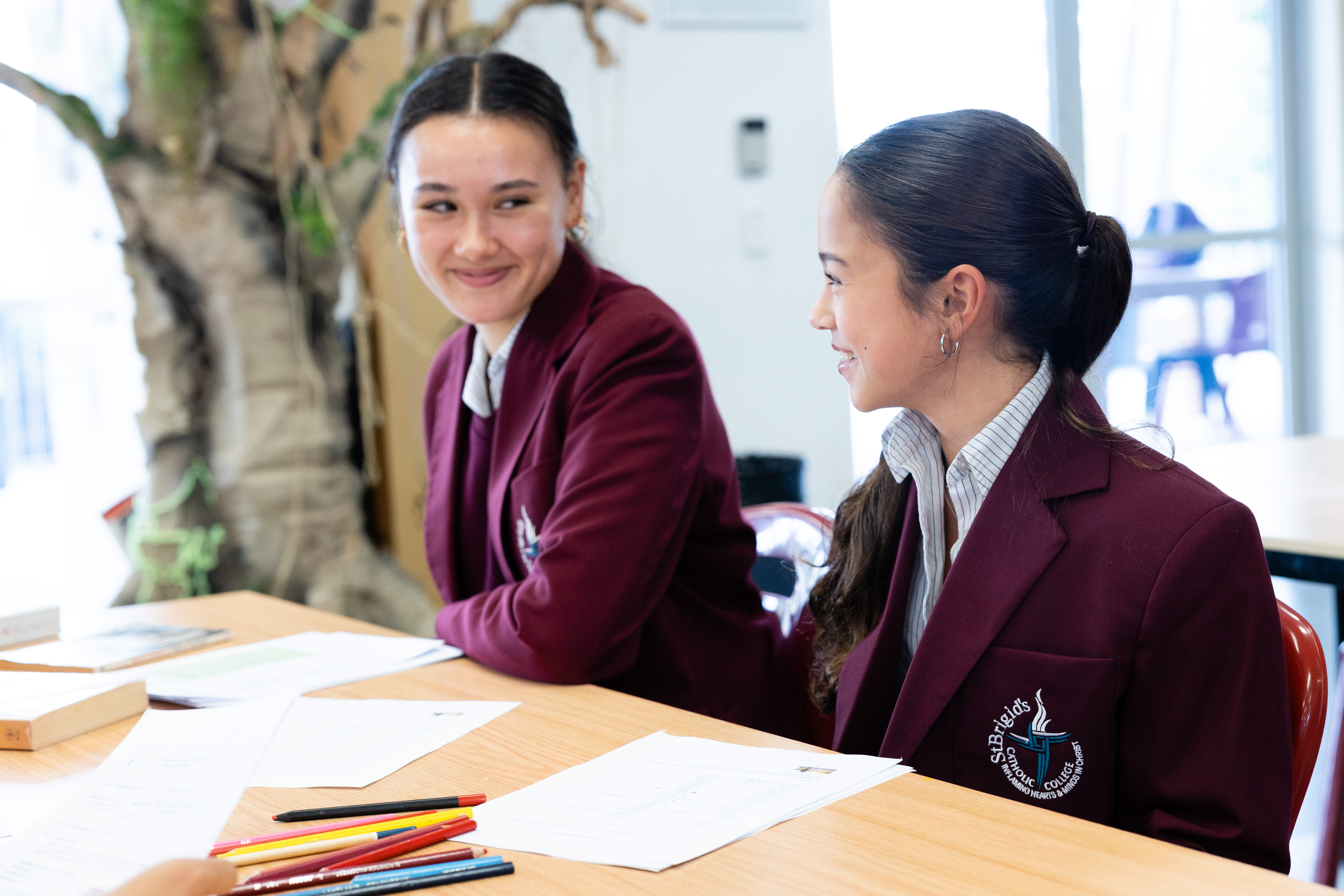
WHO CAN I SEE TO GET MORE INFORMATION?
For more information, please contact the Leader of Mathematics.
MATHEMATICS STANDARD 1
Mathematics Standard students use mathematics to make informed decisions in their daily lives. Students develop understanding and competence in mathematics through real-world applications. These skills can be used in a range of concurrent HSC subjects.
Mathematics Standard 1 improves numeracy by building student confidence and making mathematics meaningful. Numerate students can manage situations or solve problems in everyday life, work or further learning. NESA 2023
MATHEMATICS STANDARD 2
Mathematics Standard students use mathematics to make informed decisions in their daily lives. Students develop understanding and competence in mathematics through real-world applications. These skills can be used in a range of concurrent HSC subjects.
In Mathematics Standard 2 students extend their mathematical skills beyond Stage 5 without the in-depth knowledge of higher mathematics that the study of calculus would provide. This course prepares students for a wide range of educational and employment aspirations, including continuing their studies at a tertiary level. NESA 2023
MATHEMATICS ADVANCED
The Mathematics Advanced course is a calculus-based course focused on developing student awareness of mathematics as a unique and powerful way of viewing the world to investigate order, relation, pattern, uncertainty and generality. The course provides students with the opportunity to develop ways of thinking in which problems are explored through observation, reflection and reasoning.
The Mathematics Extension 1 Year 11 course includes the Mathematics Advanced Year 11 course. The Mathematics Extension 1 Year 12 course includes the Mathematics Advanced Year 12 course. All students studying the Mathematics Advanced course will sit for an HSC examination. NESA 2023
MATHEMATICS EXTENSION
Mathematics Extension 1 is focused on enabling students to develop a thorough understanding of and competence in further aspects of mathematics. The course provides opportunities to develop rigorous mathematical arguments and proofs, and to use mathematical models more extensively.
The Mathematics Extension 1 Year 11 course includes the Mathematics Advanced Year 11 course. The Mathematics Extension 1 Year 12 course includes the Mathematics Advanced Year 12 course.
The Mathematics Extension 2 Year 12 course includes the Mathematics Extension 1 Year 12 course, and therefore also the Mathematics Advanced Year 12 course. All students studying the Mathematics Extension 1 course will sit for an HSC examination. NESA 2023
Creative Arts
Study in the Creative Arts provides students with strong discipline based knowledge and the fundamental skills, creative expertise, learning mindset and critical capabilities for the future world of work. Creative Arts students experience and develop the complex skills required to create and test ideas, generate creative works with confidence, shape inquiry and to critically evaluate and reflect on what they do. Study in the Creative Arts prepares students to be significant producers and informed consumers of culture.
DRAMA
MUSIC 1
This course builds on the Stages 4 and 5 Music course. The curriculum structure is adaptable enough to meet the needs and interests of students with varying degrees of prior formal and informal learning in music and caters for students with less experience in Music. NESA 2023
VISUAL ART
Visual Arts involves students in artmaking, art criticism and art history. Students critically and historically investigate artworks, critics, historians and artists from Australia as well as those from other cultures, traditions and times. Students develop their own artworks, culminating in a ‘body of work’ in the HSC course. NESA 2023
WHO CAN I SEE TO GET MORE INFORMATION?For more information, please contact the Leader of Creative and Performing Arts (CAPA)
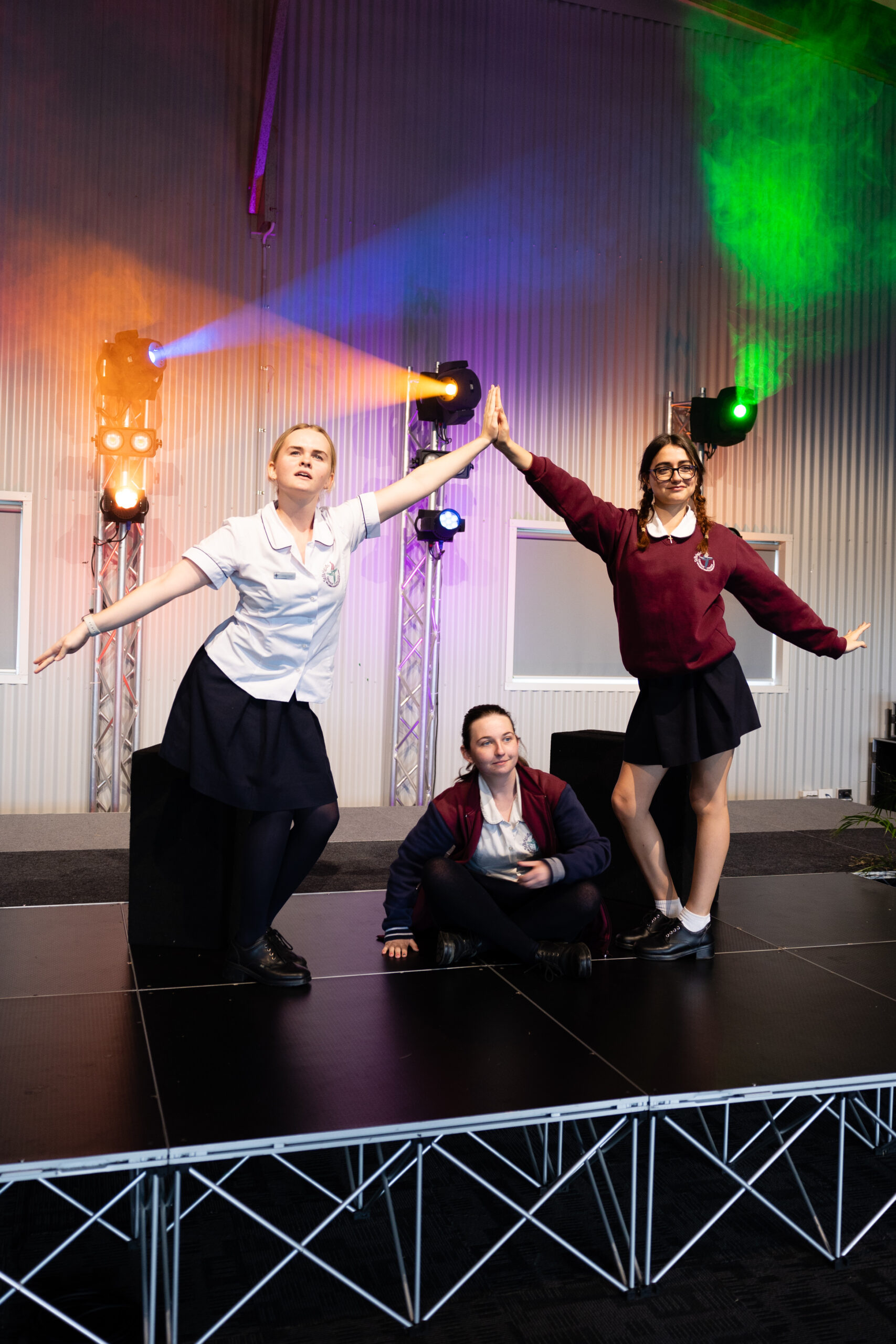
HSIE
Human Society and its Environment is the study of how humans interact with the world, how society operates and how it is changing. Through the study of HSIE, students develop the skills to prepare them to actively and responsibly participate as informed citizens in the contemporary world.
BUSINESS STUDIES
Contemporary business issues and case studies are embedded in the course to provide a stimulating and relevant framework for students to apply to problems encountered in the business environment. Business Studies fosters intellectual, social and moral development by assisting students to think critically about the role of business and its ethical responsibilities to society. NESA 2023
LEGAL STUDIES
The Preliminary course develops students’ knowledge and understanding of the nature and functions of law and law-making, the development of Australian and international legal systems, the Australian constitution and law reform. It examines an individual’s rights and responsibilities, how disputes are resolved and examines a contemporary issue concerning the individual and technology. Students have the opportunity to investigate issues that illustrate how the law operates in practice. This is achieved by investigating, analysing and synthesising legal information and investigating legal issues from a variety of perspectives.
The HSC course investigates the key areas of law, justice and human rights through a variety of focus studies, which consider how changes in societies influence law reform. NESA 2023
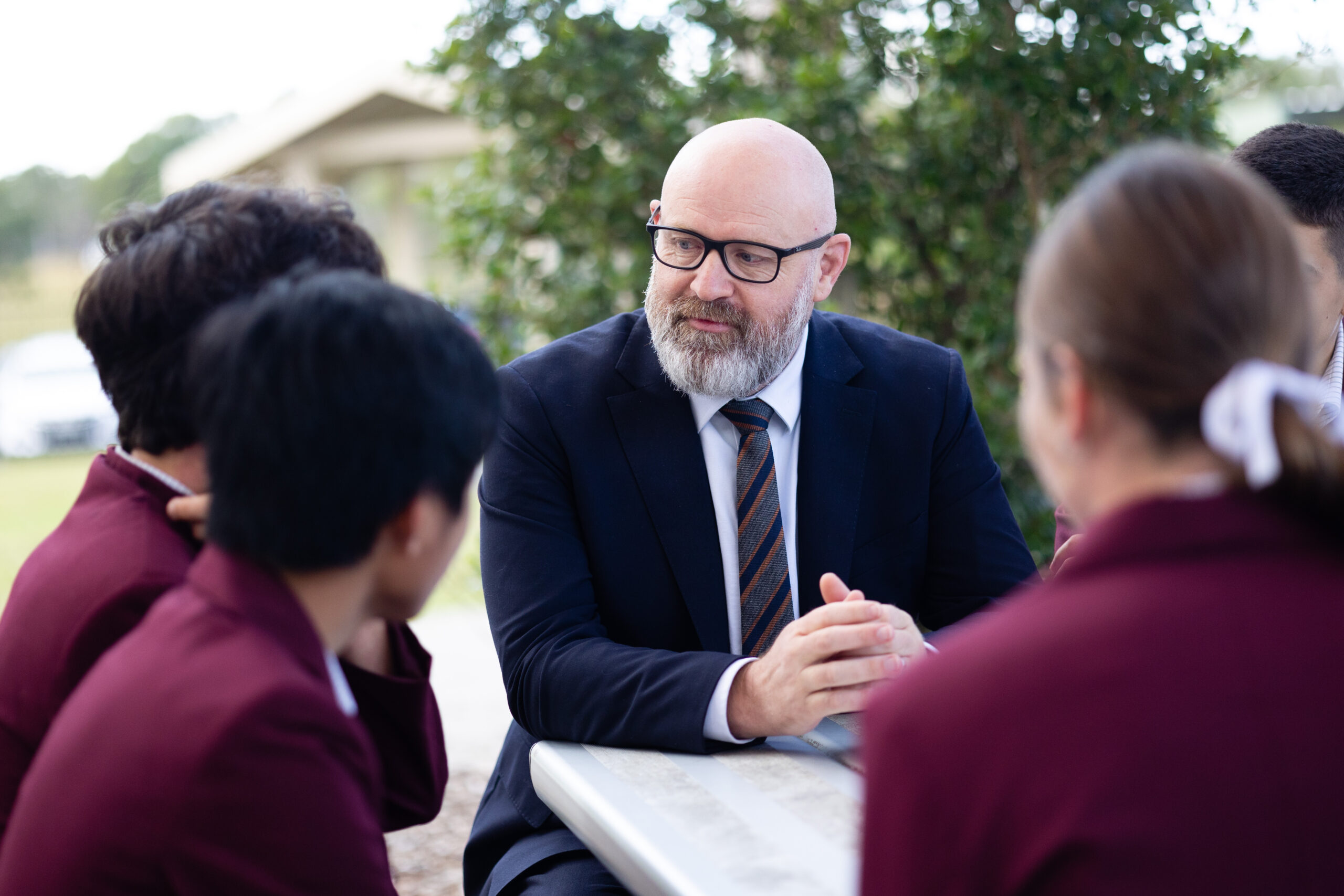
GEOGRAPHY
The Preliminary course investigates biophysical and human geography and develops students’ knowledge and understanding about the spatial and ecological dimensions of geography. Enquiry methodologies are used to investigate the unique characteristics of our world through fieldwork, geographical skills and the study of contemporary geographical issues.
The HSC course enables students to appreciate geographical perspectives about the contemporary world. There are specific studies about biophysical and human processes, interactions and trends. Fieldwork and a variety of case studies combine with an assessment of the geographers’ contribution to understanding our environment and demonstrates the relevance of geographical study. NESA 2023

ECONOMICS
MODERN HISTORY
The Year 11 course provides students with opportunities to develop and apply their understanding of methods and issues involved in the investigation of modern history. Students have the opportunity to engage in the study of a range of people, ideas, movements, events and developments that have shaped the modern world.
The Year 12 course provides students with opportunities to apply their understanding of sources and relevant issues in the investigation of the modern world. Through a core study, students investigate the nature of power and authority from 1919 to 1946. They also study key features in the history of one nation, one study in peace and conflict, and one study of change in the modern world. NESA 2023
SOCIETY AND CULTURE
Society and Culture develops social and cultural literacy and a clear understanding of the interactions of persons, society, culture, environment and time, and how these shape human behaviour. The course draws on cross-disciplinary concepts and social research methods, and students undertake research in an area of particular interest to them. The research findings are presented for external assessment in the Personal Interest Project (PIP). NESA 2023
WHO CAN I SEE TO GET MORE INFORMATION?For more information, please contact the Leader of HSIE/Languages.
Languages
FRENCH BEGINNERS
This course provides students with the opportunity to develop their linguistic and intercultural knowledge and understanding, and the speaking, listening, reading and writing skills to communicate in [Language]. Topics covered provide contexts in which students develop their communication skills in [Language] and their knowledge and understanding of language and culture. NESA 2023
For students that may have done French in Year 8, but haven’t completed two years of French Elective (Stage 5) and are interested in learning French again.
FRENCH CONTINUERS
This course provides opportunities for students to develop their skills and knowledge of [Language]. Through tasks associated with a range of texts and text types, students gain an insight into the culture and language of [Language]-speaking communities through the study of a range of texts. NESA 2023
For students that have successfully completed two years of the Stage 5 French Elective course and want to develop skills further.

WHO CAN I SEE TO GET MORE INFORMATION?For more information, please contact the Leader of Learning- HSIE/Languages
Online Courses
BROKEN BAY CROSS CAMPUS
Catholic Schools Broken Bay has been developing a range of Cross Campus Courses, that utilise the strength of the system more effectively and efficiently to:
· increase the range of curriculum opportunities for students in our system of schools
· mitigate risk of individual schools not being able to offer courses
· provide high quality teaching and learning resources for teachers in our school system
Each course will be delivered through a blended model (online and face-to-face).
Face-to-face could occur in person or via Zoom.
Details about both the Stage 6 and Stage 5 Courses on offer are provided in this booklet.
ONLINE COURSES THAT HAVE BEEN STUDIED AT THE COLLEGE
Many students have taken on an online pattern of study for their HSC. Some of the courses they have studied include:
-
Animal Studies
-
Dance
-
Tourism, Travel and Events (VET)
-
Retail Services (VET)
-
Industry Based Learning (VET)
-
Aboriginal Studies
-
French Continuers
WHO CAN I SEE TO GET MORE INFORMATION?For more information, please contact the Director of Wellbeing
PDHPE
PDHPE
The Preliminary course examines a range of areas that underpin health and physical activity. This includes how people think about health and physical activity, the management of personal health and the basis for how the body moves. Students have the opportunity to select from a range of practical options in areas such as first aid, outdoor recreation, composing and performing, and fitness choices.
In the HSC course, students focus on major issues related to Australia’s health status. They also look at factors that affect physical performance. They undertake optional study from a range of choices. This includes investigating the health of young people or of groups experiencing health inequities. In other options, students focus on improved performance and safe participation by learning about advanced approaches to training or sports medicine concepts. There is also an opportunity to think critically about the factors that impact on sport and physical activity in Australian society. NESA 2023
COMMUNITY AND FAMILY STUDIES
Community and Family Studies Stage 6 syllabus is designed to develop in each student an understanding of the diverse nature and interdependence of families and communities within Australian society. The course enables students to plan and manage resources effectively in order to address contemporary issues facing families and communities. NESA 2023
WHO CAN I SEE TO GET MORE INFORMATION?For more information, please contact the Leader of PDHPE.
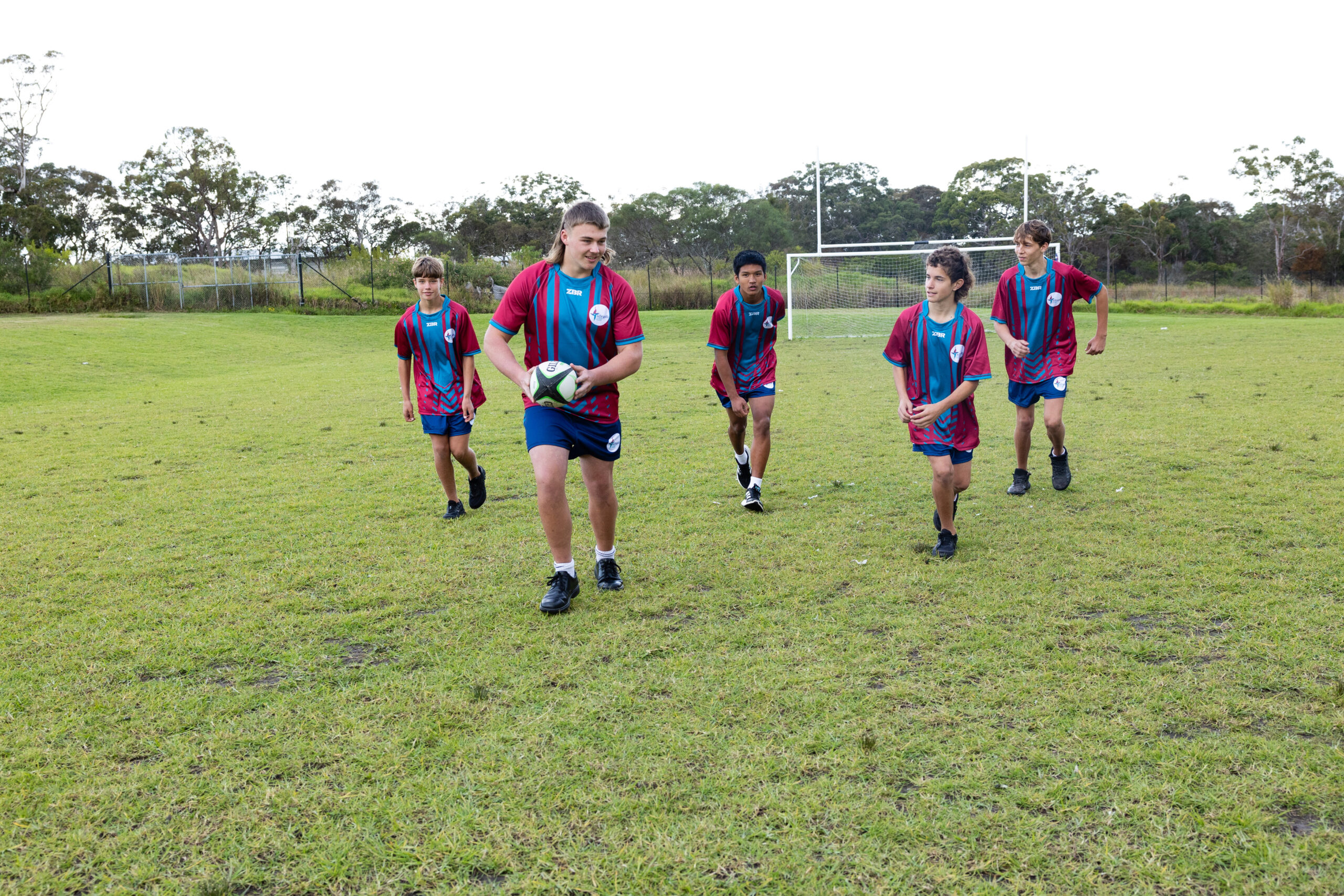
EXPLORING EARLY CHILDHOOD (1 UNIT, CEC)
Our society is increasingly recognising that children’s experiences in the early childhood years form the foundation for future growth, development and learning.
This course explores issues within an early childhood context and considers these in relation to the students themselves, their family and the community. NESA 2023
SPORTS, LIFESTYLE AND RECREATION (1 UNIT, CEC)
Students learn about the importance of a healthy and active lifestyle and recognise the need to be responsible and informed decision-makers. This course enables students to further develop their understanding of and competence in a range of sport and recreational pursuits. They are encouraged to establish a lifelong commitment to being physically active and to achieving movement potential. NESA 2023
Science
The suite of Science courses is designed to extend and provide authentic and relevant learning experiences for NSW students. The courses are rigorous and designed to prepare students for a future in STEM learning and enterprises. The depth studies within these exciting, revitalised courses provide opportunities for students to consolidate their learning, develop competence and express their creativity.
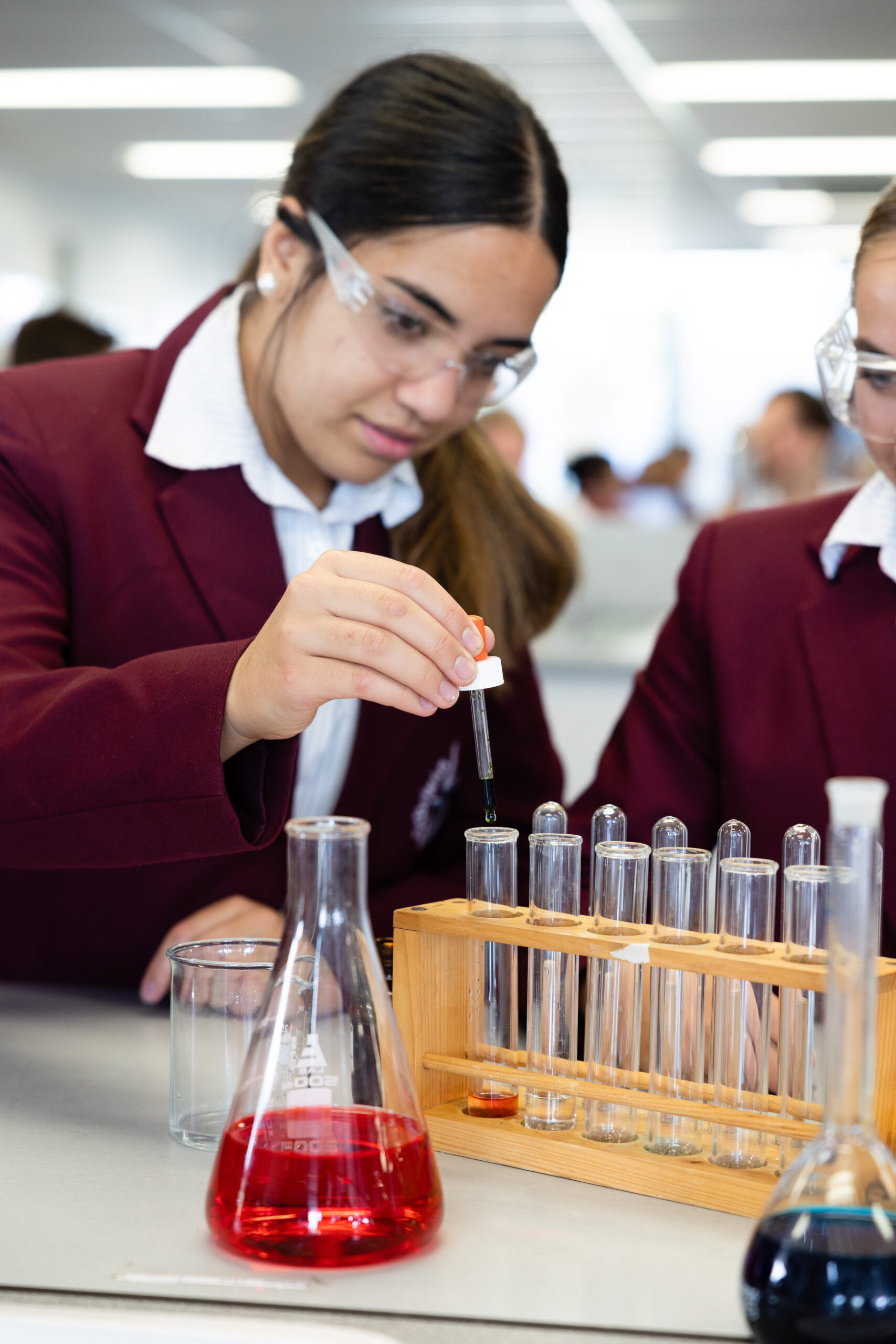
WHO CAN I SEE TO GET MORE INFORMATION?For more information, please contact the Leader of Science.
INVESTIGATING SCIENCE
The Year 11 course focuses on the centrality of observation in initiating the scientific process and examines the human tendency to draw inferences and make generalisations from these observations. Students learn about the development and use of scientific models and the similarities and differences between scientific theories and laws.
The Year 12 course builds on the skills and concepts learnt in Year 11 with students conducting their own scientific investigations and communicating their findings in scientific reports. Students are provided with the opportunity to examine the interdependent relationship between science and technology and apply their knowledge, understanding and skills to scientifically examine a claim. The course concludes with students exploring the ethical, social, economic and political influences on science and scientific research in the modern world. NESA 2023
BIOLOGY
The Year 11 course investigates cellular structure and provides a basis for understanding the way in which multicellular organisms transport and absorb nutrients and carry out gas exchange. Exploring variations in the structures and functions of organisms provides an understanding of the effects of the environment on living things and on biodiversity.
The Year 12 course investigates reproduction, inheritance patterns and the causes of genetic variation in both plants and animals. Applications of this knowledge in biotechnology and various genetic technologies are explored in the light of their uses in the treatment, prevention and control of infectious and non-infectious diseases. NESA 2023
CHEMISTRY
The Year 11 course develops the knowledge, understanding and skills in relation to the properties and structures of matter, the types and drivers of chemical reactions and how we measure the quantities involved in these processes.
The Year 12 course builds on the concepts introduced in Year 11 by examining particular classes of chemicals, processes and a variety of chemical reactions which incorporate organic compounds and acid/base equilibrium reactions. The course challenges students to apply this knowledge to the investigation of a range of methods used in identifying and measuring quantities of chemicals, which leads to an understanding of the structure, properties and trends of and between classes of chemicals. NESA 2023
PHYSICS
The Year 11 course develops students’ knowledge, understanding and skills relevant to the study of motion, how we describe it and what causes it. The course also examines energy in its different forms, and how we describe and measure electricity and magnetism and their interrelated effects.
The Year 12 course provides avenues for students to apply the concepts introduced in Year 11 and to motion in two dimensions, electromagnetism, the nature of light, and the atomic properties of matter. NESA 2023
Technology
Through the study of technology courses, students engage in a diverse range of practical experiences and develop knowledge and understanding of contemporary and advancing technologies. They develop solutions to identified problems and situations, and explore the impact of technologies on the individual, society and the environment.
INDUSTRIAL TECHNOLOGY
Industrial Technology at Stage 6 will develop a student’s knowledge and understanding of a selected industry and its related technologies, highlighting the importance of design, management and production through practical experiences.
Industrial Technology Stage 6 consists of project work and an industry study that will develop a broad range of skills and knowledge related to the focus area chosen for the course. NESA 2023
DESIGN AND TECHNOLOGY
The Preliminary course involves the study of both designing and producing. This is explored through areas such as design theory and practice, design processes, environmental and social issues, communication, research, technologies, and the manipulation of materials, tools and techniques. The course involves hands-on practical activities which develop knowledge and skills in designing and producing. The Preliminary course includes the completion of at least two design projects. These projects involve the design, production and evaluation of a product, system or environment and includes evidence of the design process recorded in a design folio. The design folio can take a variety of different forms.
The HSC course applies the knowledge and understanding of designing and producing from the Preliminary course. It involves the development and realisation of a Major Design Project, a case study of an innovation, along with the study of innovation and emerging technologies. The study of the course content is integrated with the development of a Major Design Project, worth 60% of the HSC mark. This project requires students to select and apply appropriate design, production and evaluation skills to a product, system or environment that satisfies an identified need or opportunity. The case study of an innovation requires students to identify the factors underlying the success of the innovation selected, analyse associated ethical issues and discuss its impact on Australian society. NESA 2023
FOOD TECHNOLOGY
The Preliminary course will develop knowledge and understanding about food nutrients and diets for optimum nutrition, the functional properties of food, safe preparation, presentation and storage of food, sensory characteristics of food, the influences on food availability and factors affecting food selection. Practical skills in planning, preparing and presenting food are integrated throughout the content areas.
The HSC course involves the study of: sectors, aspects, policies and legislations of the Australian Food Industry; production, processing, preserving, packaging, storage and distribution of food; factors impacting, reasons, types, steps and marketing of food product development; nutrition incorporating diet and health in Australia and influences on nutritional status. Practical experiences in developing, preparing, experimenting and presenting food are integrated throughout the course. NESA 2023
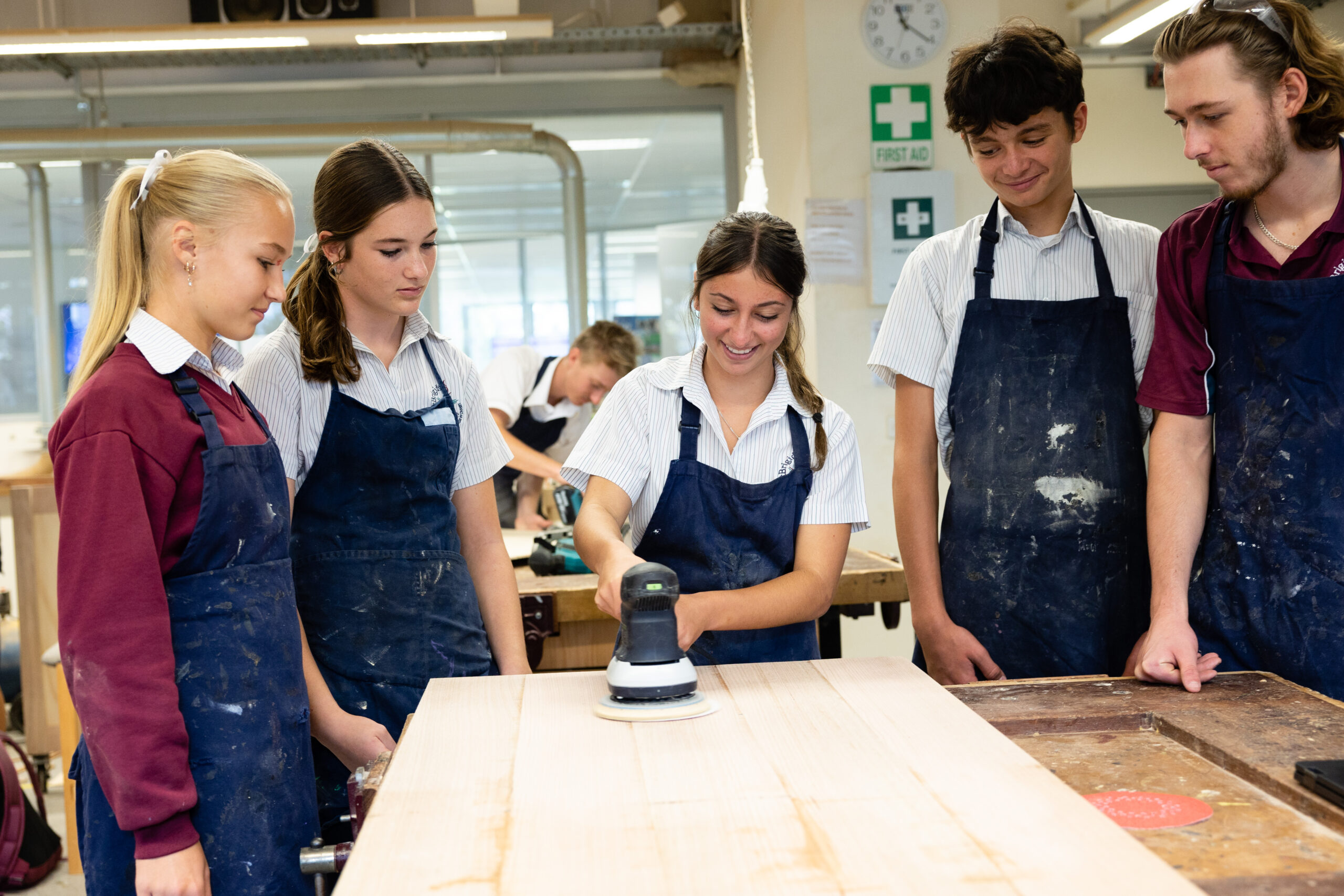
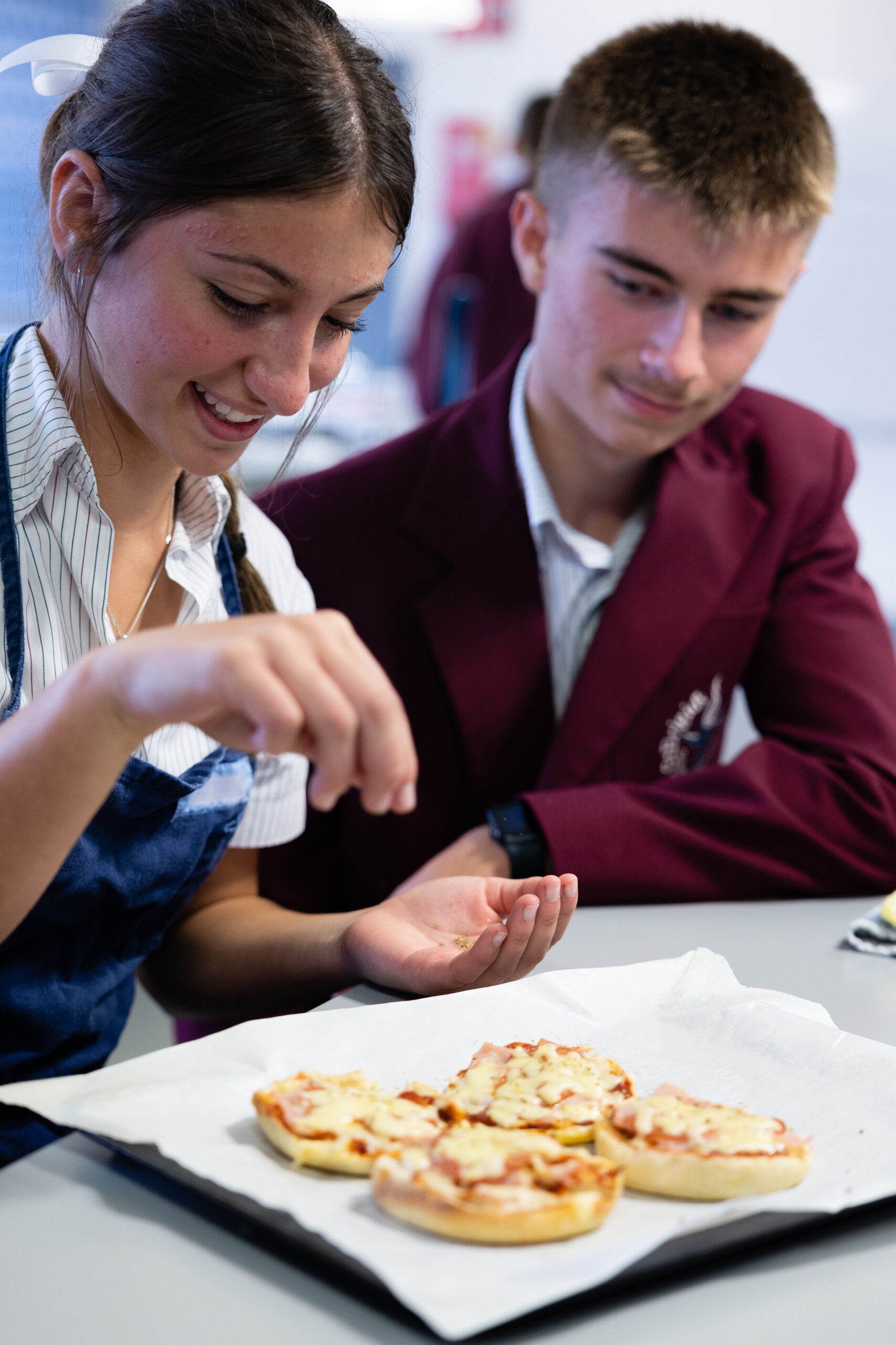
TEXTILES AND DESIGN
The Preliminary course involves the study of design, communication techniques, manufacturing methods, fibres, yarns, fabrics and the Australian Textile, Clothing, Footwear and Allied Industries. Practical experiences, experimenting and product manufacturing are integrated throughout the content areas and include the completion of two preliminary textile projects. These projects develop each student’s creative abilities and skills in designing, manipulating, experimenting and selecting appropriate fabrics for an end use.
The HSC course builds upon the Preliminary course and involves the study of fabric colouration and decoration, historical design development, cultural factors that influence design and designers, contemporary designers, end-use applications of textiles, innovations and emerging textile technologies, appropriate textile technology and environmental sustainability, current issues and the marketplace.
This course involves the development of a Major Textiles Project, worth 50% of the HSC mark. The project is selected from one of the five focus areas and enables students to explore an area of interest. The project has two components: the supporting documentation and textile item(s). NESA 2023
AGRICULTURE
This course provides students with the opportunity to study the interactions between the components of agricultural production, marketing and management, while giving consideration to the issue of sustainability of the farming system. It places greater emphasis on farm management to maximise productivity and environmental sustainability. This is an ‘on-farm’, environment-oriented course. A Farm Product Study is used as a basis for analysing and addressing social, environmental and economic issues as they relate to sustainability. NESA 2023
WHO CAN I SEE TO GET MORE INFORMATION?For more information, please contact the Leader of TAS.
TVET and SBAT Courses
The role vocational education and training (VET) courses and School Based Apprenticeships and Traineeships (SBAT) can play an integral role in helping students prepare for further education, training, employment and lifelong learning is widely recognised by key stakeholders in education.
VOCATIONAL EDUCATION AND TRAINING (VET)
Vocational Education and training (VET) courses are on-campus delivered courses in which students gain a nationally accredited qualification whilst completing their Higher School education. Currently there are three VET courses offered on campus:
-
Certificate II in Construction
-
Certificate III in Entertainment (Live Production)
-
Certificate II in Hospitality
Students can undertake one of these courses and still qualify for an ATAR. VET courses are offered in stage 6 with the addition of the Certificate I in Hospitality course in year 10.
TAFE/ELECTRONICALLY DELIVERED VET (T-VET/E-VET)
TAFE delivered VET courses (TVET) and Electronically delivered courses (EVET) are another education pathway in which students can study a VET course that is not delivered on campus. With TVET, you can get a head start on your career by completing a TAFE NSW course, while still at school.
TVET courses are available to students in Year 11 and 12 (Stage 6) as well as students in Year 9 and 10 (Stage 5). The majority of courses detailed throughout this guide are Stage 6 courses. Stage 6 TVET courses count towards your HSC, with some contributing towards your Australian Tertiary Admission Rank (ATAR).
SCHOOL BASED APPRENTICESHIP AND TRAINEESHIP (SBAT)
School Based Apprenticeship and Traineeship’s (SBAT) are available to all Year 10, 11 and 12 high school students in NSW. They allow students to commence an apprenticeship or complete a traineeship while at school.
A School Based Apprenticeship or Traineeship combines paid work, training and school; and as well as an industry recognised national qualification you will gain credit towards the HSC.
Some apprenticeships and traineeships can contribute towards the ATAR.
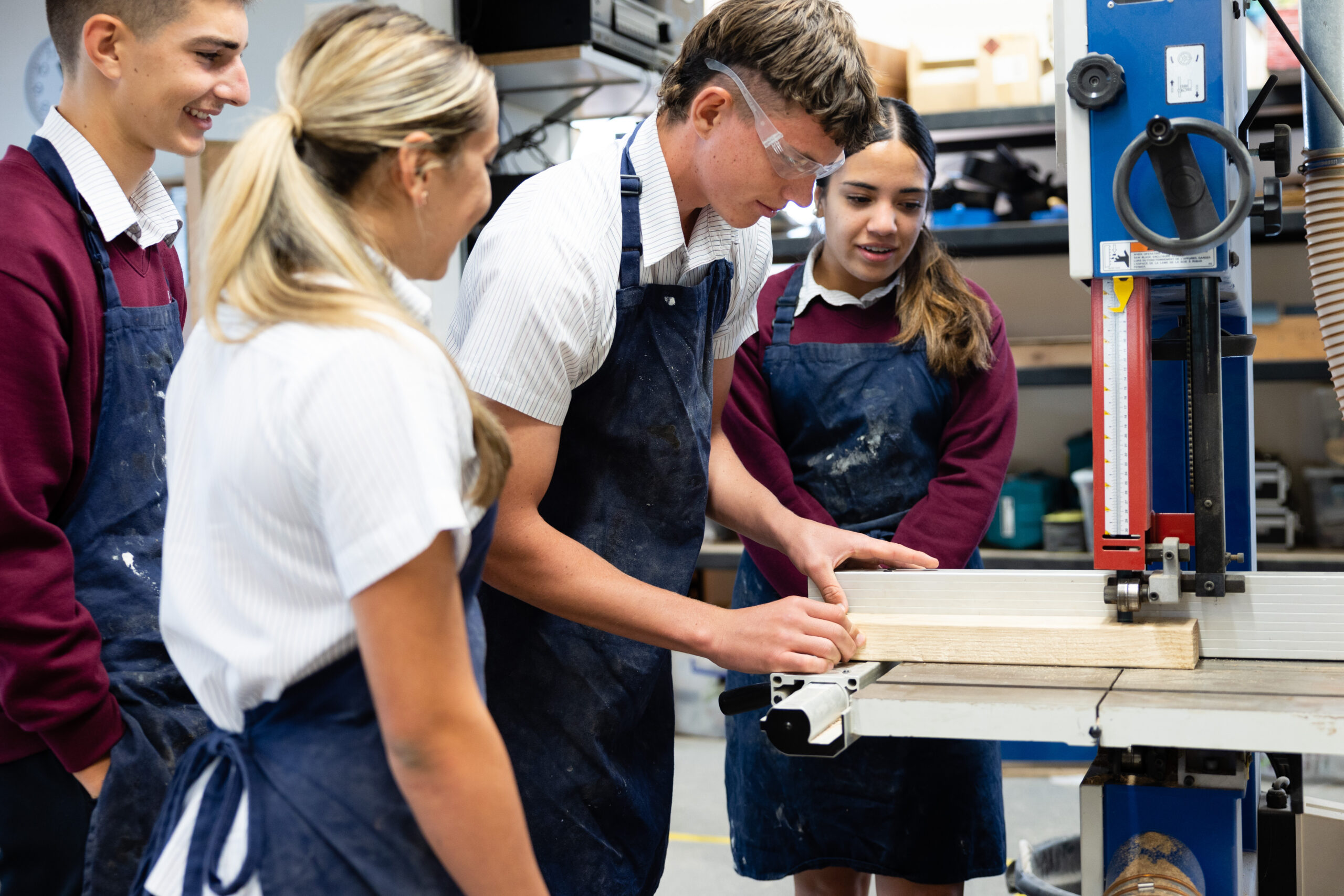
Here at the College we have had a range of students who are engaging in either SBAT or TVET courses. These have included:
Electrotechnology
Early childhood Education
Retail services
Health services – Nursing
Many students have begun investigating some of the opportunities offered with TVET and SBAT courses. If you are interested, please contact the Leader of VET for more information.
List of ATAR Eligible VET, T-VET/E-VET and SBAT Courses:
-
Automotive
-
Business Services
-
Construction
-
Electrotechnology
-
Entertainment
-
Financial Services
-
Hospitality
-
Human Services
-
Information and Digital Technology
-
Primary Industries
-
Retail Services
-
Tourism, Travel and Events
Vocational Education Courses
The role vocational education and training (VET) courses play in helping students prepare for further education, training, employment and lifelong learning is widely recognised by key stakeholders in education. Students in NSW have the option of studying VET courses at school or through TAFE NSW or other training providers. NESA package and endorse courses based on qualifications from national Training Packages or accredited courses. VET courses can only be delivered by registered training organisations (RTOs) that meet national standards and have the relevant qualification and units of competency on their scope of registration. For NSW school students in Years 9–12 VET is ‘dual accredited’. Students receive recognition towards their school qualification (Record of School Achievement or HSC), as well as a nationally recognised VET qualification (Certificate or Statement of Attainment). Some VET courses include an HSC examination which provides the opportunity for students to have this HSC examination mark contribute towards the calculation of their Australian Tertiary Admission Rank (ATAR).
CONSTRUCTION
The Construction Curriculum Framework is designed to enable students to acquire a range of technical, practical, personal and organisational skills valued in and beyond the workplace. They will also acquire underpinning knowledge and skills related to work, employment and further training in the construction industry. Through the study of this subject, students will gain experiences that can be applied in a range of contexts, including work, study and leisure and that will assist them to make informed career choices. NESA 2023
ENTERTAINMENT INDUSTRY
The Entertainment Industry Curriculum Framework is designed to provide students with appropriate learning opportunities that will enable them to acquire a range of technical, personal and interpersonal skills valued both within and beyond the entertainment industry workplace as well as underpinning skills and knowledge that can be applied in a range of contexts. NESA 2023
HOSPITALITY
The Hospitality Curriculum Framework is designed to provide students with the appropriate learning opportunities that will enable them to acquire a range of skills in the hospitality industry. These include suitable skills and knowledge for employment pathways in kitchen operations in restaurants, cafes, hotels, catering operations, clubs and institutions like schools and hospitals. NESA 2023
WHO CAN I SEE TO GET MORE INFORMATION?For more information, please contact the Leader of VET.

